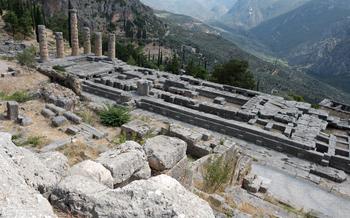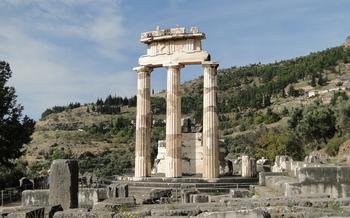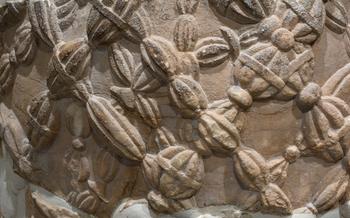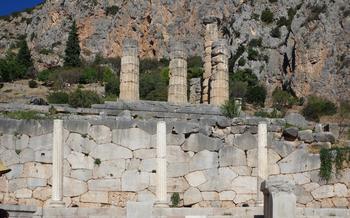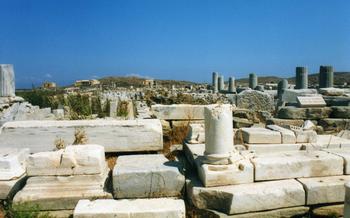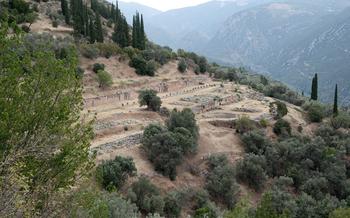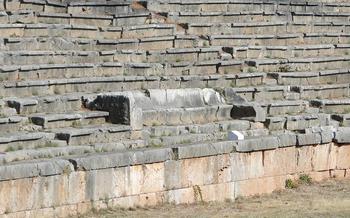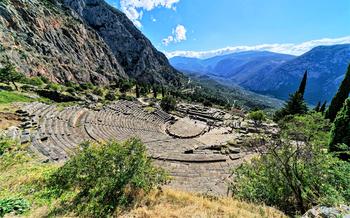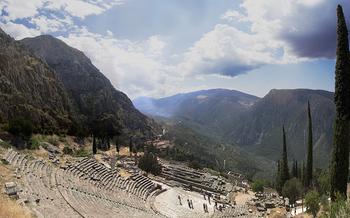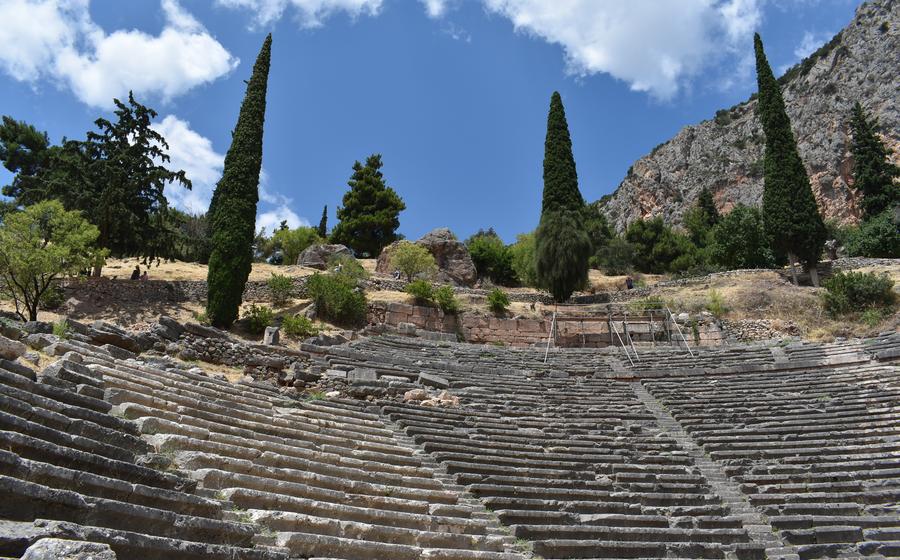
Ancient Theatre of Delphi
- Delphi: A Place of Antiquity and Wonder
- Unveiling the Ancient Theatre of Delphi
- Significance of the Ancient Theatre
- Exploring the Theatre's Architecture
- Acoustics and Performances
- Ancient Dramas and Performances
- Festivals and Celebrations
- Echoes of History
- Restoration and Preservation
- Modern-Day Events and Performances
- Tips for Visiting
- Transportation to Delphi
- Nearby Attractions
- Accommodation and Dining
- Insider Tip: Capture the Sunset
Delphi: A Place of Antiquity and Wonder
Delphi, nestled in the picturesque valley of Phocis, holds a prominent place in Greek history and mythology. It served as a sacred sanctuary and oracle, attracting pilgrims and visitors from across the ancient world. The site is renowned for its well-preserved archaeological treasures and stunning natural surroundings, making it a captivating destination for those seeking to explore the wonders of antiquity.
Delphi's significance extends beyond its historical importance. It was considered a sacred site, home to the oracle of Apollo, whose prophecies guided decisions and shaped the course of history. The ancient Greeks believed that Delphi was the center of the world, marked by a sacred stone known as the Omphalos, representing the navel of the Earth.
The archaeological site of Delphi is a testament to the city's rich past. Among its ruins, visitors can admire the majestic Temple of Apollo, the well-preserved Treasury buildings, and the awe-inspiring theatre, which played a pivotal role in the religious and cultural life of ancient Greece.
Unveiling the Ancient Theatre of Delphi
Nestled within the archaeological treasures of Delphi, the Ancient Theatre stands as a testament to the ingenuity and artistry of the ancient Greeks. Constructed in the 4th century BC, it is strategically positioned on the slopes of Mount Parnassus, offering breathtaking views of the surrounding landscape. The theatre's history is deeply intertwined with the sacred site of Delphi, where the Oracle delivered prophecies that shaped the course of ancient Greek history.
The theatre's architectural design reflects the grandeur of its purpose. Its horseshoe-shaped auditorium, carved directly into the hillside, boasts a seating capacity of over 5,000 spectators. The tiers of seats are meticulously arranged to ensure optimal viewing angles and acoustics. The orchestra, the circular performance space at the theatre's center, is surrounded by a raised stage area. The stage is adorned with intricate carvings and decorative elements, hinting at the elaborate theatrical performances that once graced this sacred space.
The Ancient Theatre of Delphi served as a hub for religious ceremonies, dramatic performances, and social gatherings. During the Pythian Games, held every four years, the theatre hosted musical competitions and theatrical events that drew participants and spectators from across the Hellenic world. Renowned playwrights such as Sophocles and Euripides showcased their masterpieces on this very stage, captivating audiences with their tales of tragedy, comedy, and satire.
Significance of the Ancient Theatre
The Ancient Theatre of Delphi served as a vibrant hub for religious ceremonies, dramatic performances, and social gatherings, making it a cornerstone of cultural and artistic life in ancient Greece.
-
Religious Ceremonies and Festivals: The theatre played a pivotal role in religious festivals honoring Apollo, the patron deity of Delphi. During these festivals, the theatre hosted processions, rituals, and musical competitions known as the Pythian Games, attracting pilgrims and visitors from across the Hellenic world.
-
Dramatic Performances and Competitions: The theatre was renowned for its dramatic performances, which included tragedies, comedies, and satyr plays. Renowned playwrights such as Sophocles and Euripides showcased their works here, attracting travelling actors and theatrical troupes who competed for prizes and recognition.
-
Social and Cultural Gatherings: Beyond religious and theatrical events, the theatre served as a gathering place for the local community. It hosted social events, political assemblies, and civic meetings, fostering a sense of unity and belonging among the citizens of Delphi.
-
Center of Artistic Expression and Entertainment: The theatre was a hub for artistic expression and entertainment, showcasing the talents of actors, musicians, poets, and dancers. It played a crucial role in promoting cultural exchange and nurturing the artistic legacy of ancient Greece.
Exploring the Theatre's Architecture
The Ancient Theatre of Delphi showcases remarkable architectural features that reflect the ingenuity and artistry of the ancient Greeks. The seating arrangements comprise tiers of stone benches, meticulously carved to provide optimal viewing angles and comfort for spectators. The tiers are divided into sections by radiating staircases, allowing for easy access and movement.
At the heart of the theatre lies the orchestra, a circular space where the chorus performed and danced. It is surrounded by a raised stage area where actors delivered their lines and interacted with each other. The proscenium, a decorative wall at the front of the stage, served as a backdrop for the performances. Intricate carvings and colorful paintings adorned the proscenium, enhancing the visual spectacle of the plays.
The theatre also boasts intricate decorative elements that add to its charm and grandeur. Sculptures of deities, mythical creatures, and scenes from Greek mythology grace the theatre's facade and interior. These carvings not only embellish the space but also provide insights into the beliefs and values of ancient Greek society.
Acoustics and Performances
Exceptional Acoustic Engineering: The Theatre of Delphi displays exceptional acoustic engineering, contributing significantly to its enduring legacy as a performance venue. The theatre's unique design and construction, along with the surrounding natural environment, create an astonishing acoustic effect, allowing the audience to experience the performances with remarkable clarity and resonance.
Amplification Effects and Clarity of Sound: The careful placement of the seating tiers, the orchestra, and the stage, coupled with the theatre's natural amphitheater form, results in an amplification effect that carries the actors' voices and the music throughout the entire auditorium. Even those seated in the uppermost rows could clearly hear the performers without the use of modern sound systems.
Staging Techniques and Theatrical Conventions: The acoustic properties of the theatre facilitated innovative staging techniques and theatrical conventions. Actors could project their voices to the farthest reaches of the audience, allowing for dynamic performances that engaged the entire crowd. The theatre's design also influenced the development of specific theatrical conventions, such as the use of masks, which enhanced the actors' vocal projection.
Immersive Experience for Audiences: The acoustics of the theatre created an immersive experience for the ancient audiences. The clarity of sound, coupled with the visually stunning backdrop of the surrounding landscape, transported the spectators into the world of the play, intensifying their emotional connection to the performances.
Ancient Dramas and Performances
The Ancient Theatre of Delphi was not just a stone structure; it was a stage for the greatest dramatic performances of the ancient world. Tragedies, comedies, and satyr plays filled the air with laughter, tears, and wonder. Renowned playwrights like Sophocles and Euripides showcased their masterpieces, captivating audiences with tales of gods, heroes, and human follies. Theatrical troupes and traveling actors brought these stories to life, using elaborate costumes, masks, and expressive gestures. The theatre became a platform for cultural exchange and artistic legacy, leaving an indelible mark on the development of Western drama.
Festivals and Celebrations
In the ancient world, the Theatre of Delphi was not only a venue for theatrical performances but also a central stage for religious ceremonies and festivals. The most renowned of these was the Pythian Games, held every four years in honor of the god Apollo. During these games, musical competitions took place alongside athletic events, showcasing the talents of musicians, poets, and dancers from across the Hellenic world.
Religious festivals were also an integral part of the theatre's calendar, particularly those honoring Apollo and other deities associated with Delphi. These festivals involved processions, rituals, and sacrifices, often accompanied by theatrical performances and musical offerings. The theatre's acoustics and dramatic setting created an immersive and awe-inspiring atmosphere for these sacred events.
The festive atmosphere in Delphi was not limited to religious occasions. The theatre also hosted social and cultural gatherings, where people from different cities and regions came together to celebrate, share stories, and witness the latest artistic creations. These events fostered a sense of community and cultural exchange, making the theatre a vibrant hub of social interaction and entertainment.
Echoes of History
The Ancient Theatre of Delphi is steeped in mythology, adding another layer of intrigue to its already captivating history. According to Greek mythology, the theatre was built by the legendary architect Trophonius, who was also responsible for constructing the Temple of Apollo at Delphi. It is believed that the theatre was used for religious ceremonies and festivals honoring Apollo, the god of music and prophecy.
The theatre is also closely associated with the Oracle of Delphi, one of the most famous oracles in the ancient world. People from all over Greece and beyond would come to Delphi to seek advice and prophecies from the oracle, who was said to speak through the Pythia, a priestess who entered a trance-like state to deliver the oracle's messages.
The theatre was also connected to the Delphic Mysteries, a series of religious rituals and ceremonies that were held in Delphi every four years. These mysteries were believed to be of great religious and spiritual significance, and their exact nature remains a mystery to this day.
Throughout history, many famous figures have visited the Ancient Theatre of Delphi, including the Greek philosopher Plato, the Roman emperor Nero, and the Byzantine emperor Justinian. These visits attest to the theatre's enduring significance and its status as a cultural and historical landmark.
Restoration and Preservation
Archaeological excavations at Delphi began in the late 19th century, leading to the rediscovery and meticulous unearthing of the ancient theatre. These excavations brought to light the remarkably well-preserved remains of the theatre, including the seating tiers, orchestra, stage area, and architectural elements.
Extensive restoration projects have been undertaken to conserve and restore the theatre to its former glory. Skilled artisans and archaeologists have meticulously reconstructed damaged sections, ensuring the theatre's structural integrity while preserving its authenticity.
Ongoing research and studies continue to shed light on the theatre's history, construction techniques, and significance. Scholars, archaeologists, and historians collaborate to deepen our understanding of this iconic monument, unraveling its secrets and enriching our knowledge of ancient Greek theatre.
The restoration and preservation efforts at the Ancient Theatre of Delphi play a crucial role in preserving this invaluable cultural heritage for future generations. By safeguarding this architectural masterpiece, we honor the legacy of ancient Greek theatre and ensure that its stories, performances, and cultural significance live on.
Modern-Day Events and Performances
Despite its ancient origins, the Ancient Theatre of Delphi is not merely a relic of the past. In recent years, there has been a revival of interest in utilizing this iconic venue for modern-day events and performances.
Occasional theatrical performances, concerts, and cultural events bring the theatre back to life, allowing visitors to experience the magic of ancient dramas in an authentic setting. These events often showcase talented artists and performers who breathe new life into the theatre's storied history.
Moreover, festivals and cultural gatherings are held within the theatre's hallowed grounds, creating a vibrant atmosphere reminiscent of its ancient heyday. These events celebrate Greek culture, music, and the arts, providing a platform for contemporary artists to showcase their work and connect with audiences in a unique and meaningful way.
By hosting modern-day events and performances, the Ancient Theatre of Delphi continues to serve as a living testament to the enduring power of art and culture. It bridges the gap between the past and the present, allowing visitors to experience the theatre's rich history while also appreciating its contemporary relevance.
Tips for Visiting
Planning Your Visit: Before embarking on your journey, research upcoming events and performances at the Ancient Theatre of Delphi. Check the official website or local tourist information centers for the latest schedules. Plan your visit accordingly to ensure you catch a captivating show or experience the theatre's acoustics during a guided tour.
Arrive Early for the Best Seats: To secure the best seats in the theatre, especially during performances, arrive early before the crowds gather. Choose a seat in the lower tiers for an immersive experience and optimal views of the stage. Remember that shade is limited, so consider bringing a hat or sunscreen to protect yourself from the sun.
Comfortable Clothing and Sun Protection: Delphi's weather can be warm and sunny, so dress comfortably in lightweight, breathable clothing. Wear comfortable shoes suitable for walking on uneven surfaces as you explore the archaeological site. Don't forget to bring sunglasses and sunscreen to protect your eyes and skin from the sun's intense rays.
Guided Tours for In-depth Insights: To delve deeper into the history and significance of the Ancient Theatre of Delphi, consider booking a guided tour. Knowledgeable guides will provide fascinating insights into the theatre's construction, acoustics, and the performances that took place within its walls. You'll gain a deeper appreciation for this ancient marvel.
Transportation to Delphi
Reaching Delphi: A Journey through Scenic Landscapes
Delphi, nestled amidst the awe-inspiring landscapes of Central Greece, is easily accessible by various means of transportation. Whether you choose to embark on a scenic road trip, take a comfortable bus ride, or join an organized tour, the journey to Delphi promises to be as captivating as the destination itself.
Driving to Delphi: A Serpentine Adventure
For those who prefer the freedom of the open road, driving to Delphi offers an unforgettable experience. From Athens, the capital of Greece, the drive takes approximately two and a half hours, traversing picturesque villages, verdant valleys, and majestic mountains. The winding roads that lead to Delphi provide breathtaking views and ample opportunities for spontaneous stops to capture the essence of the Greek countryside.
Taking the Bus: A Relaxing Journey
For travelers seeking a more relaxed option, buses offer a convenient and affordable way to reach Delphi. Regular bus services operate from Athens and other major cities, providing a comfortable and scenic journey. Sit back, enjoy the passing landscapes, and let the bus take you to the heart of ancient Greece.
Organized Tours: A Hassle-Free Experience
For those who prefer a hassle-free experience, organized tours offer a comprehensive solution. These tours typically include round-trip transportation from Athens or other cities, guided visits to Delphi's archaeological site, and additional stops at nearby attractions. With an organized tour, you can sit back, relax, and let the experts take care of the logistics while you soak in the wonders of Delphi.
No matter which mode of transportation you choose, the journey to Delphi is sure to leave you captivated by the beauty of Greece's natural landscapes and the anticipation of exploring one of the world's most significant archaeological sites.
Nearby Attractions
In addition to the Ancient Theatre, Delphi is home to a wealth of other archaeological treasures and natural wonders that are sure to captivate visitors. The Delphi Archaeological Museum houses a vast collection of artifacts unearthed from the site, including sculptures, pottery, and inscriptions that shed light on the city's rich history and culture.
A short walk from the theatre, the Temple of Apollo, with its iconic Doric columns, stands as a testament to the city's religious significance. The temple was once home to the famed Oracle of Delphi, whose prophecies influenced the course of history.
The Castalian Spring, located at the foot of Mount Parnassus, was considered sacred in antiquity and was believed to have inspired poetic and prophetic abilities. Visitors can still drink from the spring's refreshing waters and immerse themselves in its mystical aura.
For those seeking a breathtaking natural escape, Mount Parnassus offers a range of hiking trails and scenic vistas. The mountain's lush forests, towering peaks, and panoramic views make it a haven for outdoor enthusiasts and nature lovers.
Accommodation and Dining
Delphi offers a diverse range of accommodation options, catering to different preferences and budgets. From charming guesthouses nestled amidst olive groves to modern hotels with stunning views of the valley, there's something for every traveler. Immerse yourself in the local culture by opting for a traditional Greek guesthouse, where warm hospitality and home-cooked meals await. For a touch of luxury, consider one of the boutique hotels perched on the hillsides, offering panoramic vistas and upscale amenities.
When it comes to dining, Delphi's culinary scene is a delightful blend of traditional Greek flavors and modern culinary creations. Indulge in mouthwatering dishes prepared with fresh, locally sourced ingredients, such as the region's famous olives, cheeses, and honey. Sample the traditional moussaka, savor the succulent grilled meats, or opt for a seafood feast featuring the freshest catches of the day. Don't miss the opportunity to dine at one of the picturesque tavernas, where you can soak in the vibrant atmosphere while enjoying delicious Greek cuisine and local wines.
Insider Tip: Capture the Sunset
As the sun begins its descent, casting a warm golden glow over the ancient ruins, the Theatre of Delphi transforms into a magical spectacle. The fading light paints the stone seats and stage with hues of orange and red, creating an ethereal atmosphere that transports you back in time. Capture this breathtaking moment with your camera to preserve a memory of your visit to this sacred place. The sunset at Delphi is not just a visual treat but also an awe-inspiring experience that will linger in your mind long after you leave.
